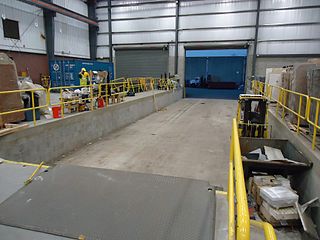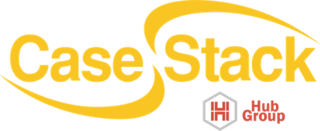Related Research Articles

In commerce, supply chain management (SCM) deals with a system of procurement, operations management, logistics and marketing channels, through which raw materials can be developed into finished products and delivered to their end customers. A more narrow definition of supply chain management is the "design, planning, execution, control, and monitoring of supply chain activities with the objective of creating net value, building a competitive infrastructure, leveraging worldwide logistics, synchronising supply with demand and measuring performance globally". This can include the movement and storage of raw materials, work-in-process inventory, finished goods, and end to end order fulfilment from the point of origin to the point of consumption. Interconnected, interrelated or interlinked networks, channels and node businesses combine in the provision of products and services required by end customers in a supply chain.

Logistics is the part of supply chain management that deals with the efficient forward and reverse flow of goods, services, and related information from the point of origin to the point of consumption according to the needs of customers. Logistics management is a component that holds the supply chain together. The resources managed in logistics may include tangible goods such as materials, equipment, and supplies, as well as food and other consumable items.

A supply chain is a complex logistics system that consists of facilities that convert raw materials into finished products and distribute them to end consumers or end customers. Meanwhile, supply chain management deals with the flow of goods in distribution channels within the supply chain in the most efficient manner.

Logistics automation is the application of computer software or automated machinery to logistics operations in order to improve its efficiency. Typically this refers to operations within a warehouse or distribution center, with broader tasks undertaken by supply chain engineering systems and enterprise resource planning systems.
A warehouse management system (WMS) is a set of policies and processes intended to organise the work of a warehouse or distribution centre, and ensure that such a facility can operate efficiently and meet its objectives.
QAD Inc. is a software company that provides enterprise resource planning (ERP) software and related enterprise software to manufacturing companies. The company has customers in over 100 countries around the world.
Oracle Applications comprise the applications software or business software of the Oracle Corporation both in the cloud and on-premises. The term refers to the non-database and non-middleware parts. The suite of applications includes enterprise resource planning, enterprise performance management, supply chain & manufacturing, human capital management, and advertising and customer experience.
Inventory control or stock control can be broadly defined as "the activity of checking a shop's stock". It is the process of ensuring that the right amount of supply is available within a business. However, a more focused definition takes into account the more science-based, methodical practice of not only verifying a business's inventory but also maximising the amount of profit from the least amount of inventory investment without affecting customer satisfaction. Other facets of inventory control include forecasting future demand, supply chain management, production control, financial flexibility, purchasing data, loss prevention and turnover, and customer satisfaction.
DELMIA, a brand within Dassault Systèmes, is a software platform designed for use in manufacturing and supply chain professionals. It offers various tools encompassing digital manufacturing, operations, and supply-chain management, including simulation, planning, scheduling, modeling, execution, and real-time operations management.
In business, a demand chain is the understanding and management of customer demand, in contrast to a supply chain. Madhani suggests that the demand chain "comprises all the demand processes necessary to understand, create, and stimulate customer demand". Cranfield School of Management academic Martin Christopher has suggested that "ideally the supply chain should become a demand chain", explaining that ideally all product logistics and processing should occur "in response to a known customer requirement".
Infor Nexus is an independent business unit of Infor LLC offering a multienterprise supply chain network. The on-demand global supply chain management platform and integrated applications are used worldwide by businesses to manage global direct procurement, supplier networks, global logistics and global trade processes. Founded in 1998, in Oakland, California, it merged with TradeCard in 2013, and in September 2015, GT Nexus was acquired by Infor. Today, Infor Nexus is a business unit of Infor.
Customer demand planning (CDP) is a business-planning process that enables sales teams to develop demand forecasts as input to service-planning processes, production, inventory planning and revenue planning.
Petrolsoft Corporation (1989–2000) was a supply chain management software company with a focus on the petroleum industry. Petrolsoft Corporation was founded at Stanford University in 1989 by Bill Miller and David Gamboa as Petrolsoft Software Group. It was later incorporated in 1992. Petrolsoft introduced demand-driven inventory management to the petroleum industry.

CaseStack was an American company that provided supply chain management (SCM) services, including warehousing, transportation, and supply chain management software (SCMS) to consumer packaged goods companies (CPGs). It used a proprietary software as a service platform for its collaborative retailer consolidation programs. CaseStack has been recognized in Food Logistics' Top 85 3PL Providers, Global Logistics & Supply Chain Strategies 100 Great Supply Chain Partners and Inbound Logistics' Top 100 3PL Providers.
Third-party logistics is an organization's long term commitment of outsourcing its distribution services to third-party logistics businesses.
Inventory optimization refers to the techniques used by businesses to improve their oversight, control and management of inventory size and location across their extended supply network. It has been observed within operations research that "every company has the challenge of matching its supply volume to customer demand. How well the company manages this challenge has a major impact on its profitability."
SolveIT Software Pty. Ltd. is a provider of advanced planning and scheduling enterprise software for supply and demand optimisation and predictive modelling. Based in Adelaide, South Australia, 70% of its turnover is generated from software deployed in the mining and bulk material handling sectors.

IES, Ltd. was a supply chain management software company that developed software for freight forwarders, customs brokers, 3PLs, importers, exporters, NVOCCs and other intermediaries to submit entries to the U.S. Customs and Border Protection, Canada Border Services Agency and other agencies.

Cleo Communications LLC, simply referred to as Cleo, is a privately held software company founded in 1976. The company is best known for its ecosystem integration platform, Cleo Integration Cloud with RADAR.
In commerce, global supply-chain management is defined as the distribution of goods and services throughout a trans-national companies' global network to maximize profit and minimize waste. Essentially, global supply chain-management is the same as supply-chain management, but it focuses on companies and organizations that are trans-national.
References
- ↑ Bryant, Adam (2014-06-07). "Stumped? Invoke the 5-Minute Rule". The New York Times. ISSN 0362-4331 . Retrieved 2020-06-26.
- 1 2 Morris, David Z. (21 August 2015). "Game on: How chess computers became logistics masterminds". Fortune . Retrieved 5 October 2015.
- 1 2 3 4 5 "Quintiq Supply Chain Planning Software Review [page 1]". allSupplyChain.com. 2011. Retrieved 5 October 2015.
- 1 2 3 4 "Quintiq: The planning puzzle". Exceptional Magazine. January 2014. Retrieved 5 October 2015.
- 1 2 3 "Quintiq expertly solving planning puzzles". Airport Business. 22 October 2014. Retrieved 5 October 2015.
- 1 2 "Quintiq Supply Chain Planning Software Review [page 2]". allSupplyChain.com. 2011. Retrieved 5 October 2015.
- ↑ "Quintiq Supply Chain Management Software Review [page 3]". allSupplyChain.com. 2011. Retrieved 5 October 2015.
- ↑ "Quintiq Supply Chain Planning Software Review [page 5]". allSupplyChain.com. 2011. Retrieved 5 October 2015.
- ↑ "Case Study: Semi-finished copper producer reduces WIP levels by 15% and improves delivery reliability by 20%. [Page 5]" (PDF). Dassault Systèmes. Retrieved 18 December 2024.
- ↑ Callus, Andrew (24 July 2014). "Dassault to buy planning software provider Quintiq". Reuters. Retrieved 29 July 2014.